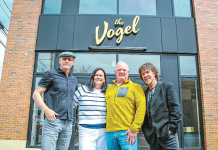By Allison Perrine
RED BANK – The borough council approved a nearly $24.2 million municipal budget last week despite some pushback from one elected official.
Council members met virtually July 29 to vote on the proposed municipal budget for 2021 as well as an amendment to the spending plan that would allocate $96,000 for repairs to the senior center. But Councilman Michael Ballard took issue with the amendment and called the proposed increase in funds “wasted money” that would delay the process of getting the senior center fixed.
“I don’t see any value to the residents in another $96,000 to the redevelopment agency, so I vote No,” Ballard said. He cast the sole ‘No’ vote on both the overall budget and proposed amendment that evening.
Red Bank residents can expect to see a zero percent increase in the municipal tax rate this year, set at 0.617. However, taxes for individual homeowners may increase based on other factors. The municipality makes up about 27 percent of residents’ tax bills; other contributors include the county, school district, library, etc.
According to Police Chief Darren McConnell, interim borough administrator, the average home assessment this year is about $406,228 and the average residential tax assessment is $2,506. If the budget were to change by $100,000 in either direction, it would impact the average homeowner by about $16. Currently, the average homeowner pays about $6.87 per day in municipal purpose taxes.
Some of the biggest challenges putting the budget together this year included the increased costs for salaries, pension contributions and overall insurance and debt services, but mostly for significant increases for landfill fees and sanitation costs. According to a budget presentation July 27, sanitation and landfill prices increased by $318,000; salaries by $211,000; debt service by $319,000; pensions by $168,000; and insurance by $58,000.
Speaking to the landfill increases, McConnell said the rise was mostly due to the borough having been in a “very beneficial situation” with its contractor previously. “We actually benefitted from prior contracts but eventually, those contracts came up for renewal and were subject to new fees,” he said.
Of the total $24,158,945 municipal budget, about 43 percent goes toward salaries and wages; 31 percent toward operating expenditures; 12 percent toward debt service; 8 percent toward pension and retirement costs; 4 percent toward uncollected taxes; and 2 percent toward utilities.
Additionally, for revenue sources, about $15,476,972, or 64 percent, will be raised by taxes; about $5,296,659, or 22 percent, will come from miscellaneous anticipated revenues; and $3,390,313, or 14 percent, from cash surplus. McConnell said the nearly $3.4 million cash surplus was available after some “conservative spending” in 2020.
“A lot of times that’s looked upon as a negative to have those so-called rainy-day funds but this is what they’re for. Had we not had that, this would have been a very different story in this budget,” said McConnell.
But during last Thursday’s meeting, Ballard questioned the carry-over of surplus funds and suggested that the borough did so to quietly prevent taxes from increasing. He said that last year, when the borough’s miscellaneous revenues were down, the town did not use almost all of its surplus to allow for a zero percent municipal tax rate. So, why do it this year?
“We’re seeing more in miscellaneous revenue,” said Ballard, “but yet we’re still plugging that gap with $3.4 million in surplus just to say we didn’t raise taxes.”
Councilman and finance chair Hazim Yassin, however, called this year’s spending plan “phenomenal” and said he was “really proud” of the budget. “It’s better than I even expected when we first started this process,” he said. “Doing something positive, in my opinion, is doing something positive for the residents for the sake of doing something positive.”
During public comments, resident Ben Forest congratulated the council for passing the budget without increasing the municipal tax rate – particularly after last year with the COVID-19 pandemic. “It’s amazing, actually, that you’ve managed to do this,” he said.
The article originally appeared in the August 5 – 11, 2021 print edition of The Two River Times.














